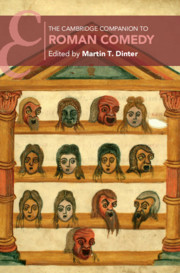Book contents
- The Cambridge Companion to Roman Comedy
- The Cambridge Companion to Roman Comedy
- Copyright page
- Dedication
- Contents
- Illustrations
- Contributors
- Prologue
- Acknowledgements
- Extant Plays by Plautus and Terence
- Abbreviations Used for References to Fragments
- Introduction: Roman Comedy
- Part I The World of Roman Comedy
- Part II The Fabric of Roman Comedy
- Part III The Sociology of Roman Comedy
- Part IV The Reception of Roman Comedy
- Bibliography
- Index Rerum
- Index Locorum
- Cambridge Companions to …
- References
Part III - The Sociology of Roman Comedy
Published online by Cambridge University Press: 30 March 2019
- The Cambridge Companion to Roman Comedy
- The Cambridge Companion to Roman Comedy
- Copyright page
- Dedication
- Contents
- Illustrations
- Contributors
- Prologue
- Acknowledgements
- Extant Plays by Plautus and Terence
- Abbreviations Used for References to Fragments
- Introduction: Roman Comedy
- Part I The World of Roman Comedy
- Part II The Fabric of Roman Comedy
- Part III The Sociology of Roman Comedy
- Part IV The Reception of Roman Comedy
- Bibliography
- Index Rerum
- Index Locorum
- Cambridge Companions to …
- References
Summary

- Type
- Chapter
- Information
- The Cambridge Companion to Roman Comedy , pp. 171 - 258Publisher: Cambridge University PressPrint publication year: 2019
References
Further Reading
James (1998b), Lape (2004a), Henderson (2004), Fantham (2004d) as well as the relevant sections of Konstan (1983) and Hunter (1985) provide good points of entry into father and son relationships in Roman comedy.
Gruen (1992) showcases how Roman identity developed vis-à-vis Hellenism. See Jaeger (1945) on paideia, Bonner (1977) on Roman education in general, and Gildenhard (2007) on Cicero’s attempts to incorporate the Greek concept of paideia into the Roman educational ideal. Bloomer (2011) traces the Roman school curriculum and the use of the Disticha Catonis in schools. Jocelyn (1973) unearths the history of one famous Terentian sententia.
Further Reading
Stace (1968), Spranger (1984), and Duckworth (1952) contain some useful material on slaves in Roman comedy, though their approach is outdated. The most penetrating discussion of this topic is to be found in McCarthy (2000), which focuses on Plautus. Conveniently, McCarthy has followed this up with an excellent study of slaves in Terence (McCarthy 2004). Thalmann’s (1997) study of the Captiui is challenging and theoretically sophisticated. Particular aspects of slaves in comedy are treated by Parker (1989/2001), Rei (1998), and Anderson (1993). Fitzgerald (2000) is a general study of slavery in Latin literature which deals with comedy in several places. More recently, Stewart (2012) has studied the plays of Plautus in relation to Roman slavery and Richlin (2014) the Plautine slaves in their contemporary context. Richlin (2017a) provides a challenging new account of Plautus as theatre by, through, and even for slaves. On the reception of the slave character, see Candiard (2017).
Further Reading
There are several helpful studies of female stock types: on the wealthy matrons, see Schuhman (1977) and Stärk (1990); on the meretrices, see Henry (1985) and Fantham (2004a) and (2004b); on bona meretrix, see Gilula (1980). Among particularly useful analyses of individual plays are Gold (1998) on the Casina, Fantham (2004a) and (2004b) on the Cistellaria and Poenulus, Konstan (1986) on the Eunuchus, and Knorr on the Self-tormentor (1995). Several chapters on marriage and relationships in monographs on comedy offer useful insights: see especially Konstan (1983) passim; (1986); (1995) 120–40; Moore (1998b) esp. 140–80; cf. Slater on the Casina (1985) and (2000) 57–76. On the language of female characters, see Adams (1984). These works take the notion of ‘female’ or ‘woman’ as a given and explore how female personae function in the plots and performance of comedy. Conversely, studies of gender in comedy aim to find out what kinds of gendered identities (both female and male) comic plots and comic language construe. On gender in Latin comedy and elegy, see James (1998a); on language and gender, Dutsch (2004), (2005), and (2008), especially chs. 1, 2, and 3, and James (2005); on aspects of masculinity in comedy, see McDonnell (2006), ch. 1. See also James on gender and sexuality in Terence (2013). On the gendering of emotions in Greek and Roman comedy, see Dutsch and Konstan (2011). In general, see now Dutsch, James, and Konstan (2015).
Further Reading
Hanson (1959) remains the most useful introduction to the topic, with Schilling (1979) offering a rather different approach. Fraenkel (2007), originally published in German in 1960, is an essential starting point for nearly all aspects of the study of Plautus, although his groundwork has now permitted further studies to consider the plays more organically. Studies that are not specifically concerned with gods but very important for considerations of how to relate the plays to society include McCarthy (2000) and Leigh (2004). Gruen (1990) and (1992) are important for the socio-political backdrop. Clark (2007) probes the issues surrounding a specific set of gods and their treatment by Plautus in more detail. All provide fuller bibliographies.
Further Reading
The following suggestions are necessarily selective; Ward (1995) and Posner (2009) provide a good starting point for ‘Law and Literature’ in general. See also Kenney (1969), Hollis (1994), and Cloud (1989). For a recent comprehensive bibliography on law and Plautus, see Gaertner (2011a) and (2011b) (in German). Most publications on Roman law and comedy include introductory sections that ease the reader into the matter, see Scafuro (1997) 1–21 and Gaertner (2011a). Paoli (1976) (in Italian) is an important collection of articles; Watson (1971) draws on comic passages in an attempt to reconstruct the law of 200 bc; Costa (1890) (for Plautus) and (1893) (for Terence) provide useful collections of assorted passages.
Stroux (1926), Kornhardt (1953), Büchner (1957), and Fuhrmann (1971) provide a lively discussion of the sententia ‘summum ius summa iniuria’. Brown (2005) (Plautus’ Cistellaria), Partsch (1910) (Plautus’ Persa), Lallier (1878), and Lefèvre (1978b) 5–31 (both Terence’s Phormio) discuss the legal framework of the respective plays. Gaertner (2011b) offers a line-by-line commentary on most Plautine passages referring to law. For Terence, see Schwind (1901). Aspects of legal language are also discussed by Dunn (1984) 5–66 and Karakasis (2003).
Procedural law: On settling disputes in general, see Scafuro (1997); on the usage of arbiter (‘arbitrator’) and iudex (‘judge’) in Plautus and Terence, see Ahrens (1970); on a iudex’ social background, see Gagliardi (2007) or (2008); on the in ius uocatio (‘initiating procedure’), see Paoli (1952), Witt (1971a) and (1971b), Scafuro (1997) 68–114; on restitutio in integrum (‘reinstatement into the former legal position’), see Kornhardt (1954); on interdicta (‘interdicts’), see Falcone (1988).
Family law: In general, see Fredershausen (1912) and Watson (1967) passim; legal information on the epiclerate may be found in Harrison (1968) 1–12, 122–38, and MacDowell (1978) 84–98; the most exhaustive treatment is Karabélias (2002) for Athens and (2004) for other poleis; on the epiclerate in New Comedy, see Paoli (1943), Scafuro (1997) 281–305, and Kuhn-Treichel (2018); on fathers, sons, and daughters, see Bramante (2007); on marriage, see Dees (1988) and Williams (1958); on divorce, see Rosenmeyer (1995), Scafuro (1997) 306–26, Schuhmann (1976), and Nesselrath (2018).
Property & contracts: In general, see Watson (1965) (on obligations) and (1968) (on property); on the stipulations in Plautus’ Pseudolus, see Platschek (2018); on mancipatio, see Brophy (1974), Tomulescu (1971), and Gaertner (2018); on pignus (‘pledge’), see Schanbacher (2006); on depositum (‘deposit’), see Scheibelreiter (2012) and (2018); a contract for hiring a prostitute is analysed by Scafuro (2003/2004); for private auctions, see Donadio (2007); on sales in Plautus’ Curculio and Pseudolus, see Pringsheim (1916) 34–8; for a ‘Romanistic approach’ on the sale in Plautus’ Rudens, see Pennitz (2013); on arr(h)a in Plautus, see Pringsheim (1950) 415–29 and MacCormack (1971).
Further Reading
On lending and borrowing money (usually with outrageous interest rates) Millett (1991) is essential. Garnsey et al. (1983) contains many useful papers on ancient trade. Cohen (1992) provides an excellent introduction to ancient economic realities; Casson (1976) relates these to New Comedy. Skiles (1941) examines the vocabulary of commerce, Hindsholm (1990) the socio-economics of Roman comedy. Feeney (2010) elucidates the (financial) dynamics in Pseudolus. For the economics of Latin literature in general and Latin epic in particular, see Coffee (2009); on the finances in declamatory families, see Fantham (2004e).



